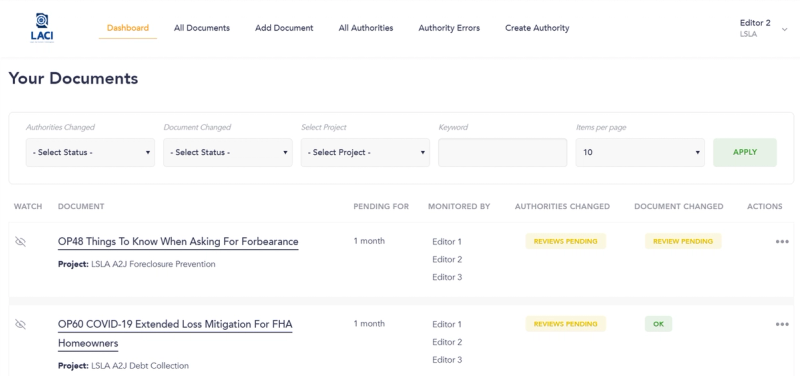Project LACI

Project LACI (Legal Aid Content Intelligence) helps organizations maintain content that has legal information, including generative AI RAG materials, keeping them up to date with changes to the law.
Project Description
Project LACI (Legal Aid Content Intelligence) is a Drupal-based web application and set of modules developed by Lone Star Legal Aid (LSLA) to help legal aid organizations maintain the accuracy and relevance of their legal information resources, including the Retrieval Augmented Generation (RAG) materials that generative AI tools may use. LACI is designed to automatically track how laws and court opinions are treated over time – alerting legal aid staff when the statutes, rules, regulations, or precedents they rely on may have been modified, cited, refined, or overturned.
LACI integrates with the CourtListener API from the Free Law Project, which provides real-time access to citation networks and opinion metadata. This connection allows LACI to serve as a sort of always-on legal research assistant: when a legal aid organization publishes a public legal information document that cites case law, LACI watches for new decisions that affect that precedent. When something changes – such as a key case being distinguished, reversed, or questioned – LACI notifies the content authors so they can review and, if needed, revise the document.
Since its first production deployment in May 2024, LSLA has used LACI to monitor nearly 800 legal help documents for ongoing legal accuracy. In 2024, LACI received Sustainability, Enhancement, and Adoption (SEA) TIG funding from LSC to support the integration of LACI by two partner organizations: Texas Legal Services Center and Idaho Legal Aid Services, Inc.
LACI is licensed under the AGPLv3+, enabling legal services providers and technologists to freely adopt, modify, and contribute to its development. The application and related Composer packages are available on Codeberg, where interested organizations can download and run the software as a standalone tool or integrate it into their own Drupal systems. This licensing structure supports both transparency and collaboration while meeting the requirements of Drupal's open-source ecosystem and LSC’s funding terms.
LACI demonstrates how public legal information can be maintained with the help of automation and open legal data. It reflects a broader vision of building shared infrastructure across the legal aid community to improve quality, reduce maintenance burdens, and ensure that clients and the public receive current and reliable guidance.